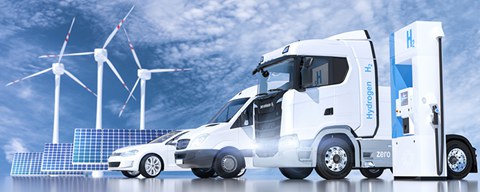Nov 04, 2022
Content presentation of the 4th Boysen-TUD-RTG - Overview
As announced in the news of 21.09.2022, we would like to take the opportunity to present our 4th Boysen-TUD-Research Training Group (start 01.01.2023) with the overarching topic "Hydrogen Economy - Strategic Element of a Future GreenGas Deal" in more detail in the coming weeks. Today we start with the motivation for the topic of the Research Training Group and an overview of the participating clusters. In the coming weeks we will outline the participating clusters in more detail.
Why "hydrogen" as the topic for a 4th Boysen-TUD-Research Training Group at TU Dresden? Hydrogen-based systems have been an integral part of the TUD's research strategy for years. Within basic research, unique selling points lie in particular in the research and further development of electrolysis processes, in the development of biotechnological processes (in cooperation with the UFZ Leipzig), in the development of sensors and in the storage of hydrogen with innovative functionalised bioinspired materials. In application-oriented research, the TU Dresden is particularly involved in the development of hydrogen-based energy storage, mobility, and drive systems. Drive and storage systems, e.g. for aviation, for rail and commercial vehicles, as well as for work and agricultural machines, are particularly noteworthy here.
However, hydrogen as a secondary energy carrier does not per se ensure low greenhouse gas emissions or even low-loss energy cycles. The highly reactive substance also places high demands on safe processing. The need for research is therefore high and acute. The 4th Boysen-TU Dresden-Research Training Group will make a decisive contribution to satisfying it. It is structured in four clusters, which integrate 16 doctoral projects and corresponding scientists and disciplines from the fields of natural, technical, social and medical sciences. The clusters each deal with a sub-task within the overall project of making the hydrogen economy a strategic element of a future GreenGas deal.
Scientific studies, e.g. on the production, conversion, processing, storage, transport as well as reconversion of hydrogen as a secondary energy carrier, will thus be holistically investigated; valuable contributions to strengthening teaching as well as teacher and further education are also expected. In view of the necessary decarbonisation of today's energy systems and with the aim of being able to transfer the generic results achieved in the Research Training Group to real H2 systems, a self-sufficient energy park is chosen as a real laboratory. This energy park serves as a reference for almost all projects and consists of regenerative energy systems (PV, wind energy, etc.) for power generation. Such an infrastructure is to be used, among other things, for the evaluation and optimisation of H2-based technologies, integrating research and application as well as aspects of social responsibility and acceptance as close to practice as possible.
Another doctoral project, which is to be assigned to the human sciences, is planned as an associated project. The four bridging projects that have been established since 2022 for the transition to the fourth generation of the RTG will be integrated into the clusters. Close cooperation between the projects both within the clusters and across clusters is ensured by the structure and diversity of content of the Research Training Group. The main topics of the clusters in detail:
- Cluster E: "Hydrogen imports from the MENA region compared to hydrogen production in Germany" examines potentials, risks and requirements of hydrogen imports from the regions of the Middle East and North Africa to Europe and compares the production of hydrogen to the situation in Germany.
- Cluster F: "Impact H2 green" deals with the far-reaching consequences of exploiting all wind and solar potentials for energy supply from a technological-systemic, landscape, ecological, economic and entrepreneurial perspective and with the aim of achieving sufficient availability of so-called "green H2" from renewable energy sources.
- Cluster G: "Electrocatalysts for a competitive hydrogen economy" focuses on the development of highly effective, precious metal-free electrocatalysts as the basis for the future competitiveness of fuel cell technology. In the process, perspectives from chemistry, laboratory and process technology are linked with subject didactic and educational approaches.
- Cluster H: "Techno-economic modelling of hydrogen value-added networks" develops methods for the holistic analysis of hydrogen value-added networks. A multi-perspective approach is pursued in which hydrogen value creation networks are examined from a technological and economic perspective and from a network, actor and process perspective as well as from a drive technology perspective.
- Associated doctoral project: "Health effects of traffic noise in different mobility scenarios of the future - estimation of the burden of disease".

